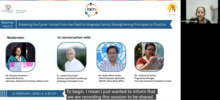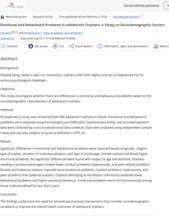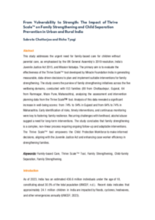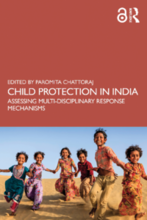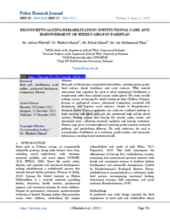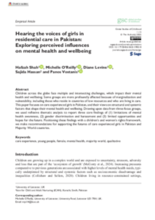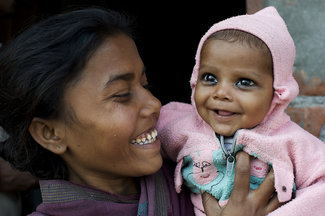

Displaying 1 - 10 of 757
This session, during Dasra Philanthrophy Week, brings together thought leaders, policymakers, funders, and civil society actors to reflect on where children are being missed, why risks go unidentified, and how systems can be strengthened. Drawing from policy, practice, and lived realities, the conversation will explore how early identification and cross-sector coordination can enable stronger and more timely child protection responses.
This article notes how a pan-India study revealed that thousands of children of incarcerated parents (CoIP) are left invisible and vulnerable within India’s criminal justice system despite Supreme Court mandates intended to protect their rights and well-being.
In this webinar, speakers shared the principles, practices, and innovative initiatives in family strengthening across the East and North-Eastern regions of India. Speakers reflected on evolving family vulnerabilities, the role of family-based care in care reform, and what it truly takes to embed family-strengthening principles into everyday practice.
This study examined differences in emotional and behavioural problems among 400 adolescent orphans in Kerala, India using the Strengths and Difficulties Questionnaire to assess how sociodemographic factors shape mental health outcomes. The findings revealed significant variations by gender, religion, type of orphanhood, length and type of institutional care, underscoring the need for tailored psychosocial interventions that reflect these differences.
The article highlights a deeply troubling crisis facing street-connected children in Pakistan, who remain largely invisible to authorities and are subject to widespread sexual exploitation and abuse, exacerbated by poverty, lack of safe shelter, l
In this article, Hasht-e Subh reports that the Taliban has abruptly closed private orphanages across Afghanistan, seized their assets, and transferred thousands of vulnerable children into state-run facilities under Taliban control—raising deep co
This study addresses the urgent need for family-based care for children without parental care, as emphasised by the UN General Assembly’s 2019 resolution, India’s Juvenile Justice Act 2015, and Mission Vatsalya. The primary aim is to evaluate the effectiveness of the Thrive Scale™ tool developed by Miracle Foundation India in generating measurable, data-driven decisions to plan and implement suitable interventions for family strengthening.
This book offers a comprehensive exploration of the institutional, legal, and social frameworks surrounding child protection in India. Anchored in a multidisciplinary approach, the book brings together insights from law, social work, psychology, education, and public policy to examine how various systems interact in addressing the issues related to protection of children from abuse, neglect, trafficking, and exploitation.
This study examines whether institutional rehabilitation for street girls in Pakistan is genuinely transformative by assessing services at the Zamung Kor Model Institute through a gender- and child-centred lens. While findings show improvements in safety, emotional regulation, and educational engagement, persistent gaps in trauma-informed care, vocational pathways, and post-discharge support highlight the need to reconceptualize rehabilitation as a continuous, community-linked process.
This paper explores the mental health and wellbeing of care-experienced girls in Pakistan, highlighting how structural and systemic factors shape their experiences. Using focus group data, it identifies limited mental health awareness, gender discrimination and harassment, and restricted opportunities as key challenges, and offers recommendations framed within children’s and women’s rights to better support their futures.

